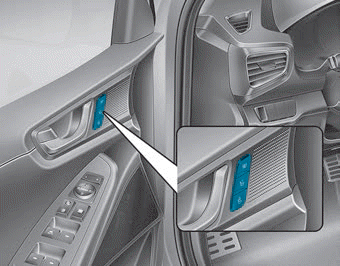Hyundai Ioniq: Ignition System / Description and operation
Hyundai Ioniq (AE) 2017-2025 Service Manual / Engine Electrical System / Ignition System / Description and operation
| Description |
Ignition timing is controlled by the electronic control ignition timing system. The standard reference ignition timing data for the engine operating conditions are preprogrammed in the memory of the ECM (Engine Control Module).
The engine operating conditions (speed, load, warm-up condition, etc.) are detected by the various sensors. Based on these sensor signals and the ignition timing data, signals to interrupt the primary current are sent to the ECM. The ignition coil is activated, and timing is controlled.
 Repair procedures
Repair procedures
On-vehicle InspectionSpark test1.Check for DTCs.
•
If a DTC is present, perform troubleshooting in accordance with the procedure for that DTC...
Other information:
Hyundai Ioniq (AE) 2017-2025 Service Manual: Components and components location
C..
Hyundai Ioniq (AE) 2017-2025 Service Manual: Relay Box (Passenger Compartment). Description and operation
DescriptionAuto Cut System of Dark Current Abbreviation Expalnation AAFActive Air FlapACUAirbag Control UnitAEBAutonomous Emergency BrakingAHBActive Hybrid Brake SystemAMPAmplifierAVNHead Unit (Audio / AVN)B_CANBody Controller Area NetworkBCMBody Control ModuleBMSBattery Management SystemBSDBlind Spot DetectionC_CANChassis Controller Area NetworkCARMERARear View CarmeraCLUCluster ModuleDATCDual Automatic Temp ControlFPCMFuel Pump Control ModuleHPCUHybrid Power UnitIGPMIntergrated Gateway & Power control ModuleLDWSLane Departure Warning SystemM_CANMulti media Controller Area NetworkMDPSMotor Driven Power SteeringP_CANPowertrain Controller Area NetworkPASParking Assist SystemSJBSmart Junction BlockSMKSmart Key UnitTCM(DCT)Double Clutch Transmission UnitVESSVirtual Engine Sound SystemSmart Junction Block (SJB) General function : Interior Junction Block + some functions of BCMIt controls loads with CAN communication and IPS...
Categories
- Manuals Home
- 1st Generation Ioniq Owners Manual
- 1st Generation Ioniq Service Manual
- Towing
- Tilt Steering / Telescope Steering
- Washer Fluid
- New on site
- Most important about car
Driver Position Memory System

The Driver Position Memory System is provided to store and recall the following memory settings with a simple button operation.
- Driver's seat position
- Side view mirror position
- Instrument panel illumination intensity
Copyright © 2025 www.hioniqae.com

